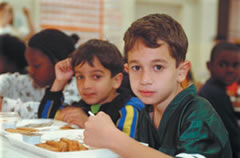|
It would be nearly impossible to formulate a joke where the punchline is "healthy school lunch," so we won't try. And it's no joking matter anyway—the fare in school cafeterias these days is clearly designed to suit students' picky palates, not the needs of their growing cells. But food choices do have health consequences for those in school, just like for anyone else.
 Fortunately, healthy school lunches are quite possible, and we have an article today to tell you how an organic school lunch can be a tasty part of the plan. It comes from
Beyond Pesticides
a group that works to protect public health and the environment by leading the transition to a world that is free of toxic pesticides. Fortunately, healthy school lunches are quite possible, and we have an article today to tell you how an organic school lunch can be a tasty part of the plan. It comes from
Beyond Pesticides
a group that works to protect public health and the environment by leading the transition to a world that is free of toxic pesticides.
~ ~ ~
Organic Food Movement Grows in Schools and Homes
Scientific Evidence Shows that Organic Diets Keep Chemicals Out of Children
by Beyond Pesticides
In an effort to keep children's diet free of pesticides, antibiotics and genetically engineered ingredients, increasing numbers of parents and schools throughout the country are purchasing organic food.
Schools in Washington State and California are leading the nation in introducing organic food as part of healthy school lunch programs. An organic salad bar started at Lincoln Elementary School in Olympia has proven so popular and economically feasible, all grade schools in Olympia now have one. In 2004, the Seattle school district adopted H61.01, a Breakfast and Lunch Program Procedure banning junk food and encouraging organic food in school cafeterias. California school districts in Berkeley, Santa Monica, and Palo Alto also have organic food programs.
Parents are increasingly driving this demand for organic food in their homes as well as in schools. AC Nielsen marketing ratings show that sales of organic baby food have jumped nearly 18 percent since 2004—double the overall growth of organic food sales. According to the Organic Trade Association, organic dairy, produce, and snacks—food purchased often for children—are rapidly growing segments of the organic food market. Due to rising demand, organic food for children is now available in mainstream supermarkets such as Safeway as well as in natural food stores.
Organic Yogurt Maker Cultures Healthy School Lunches
Responding to increasing parent concern about healthy school lunches (or the lack thereof), organic companies have assisted in developing organic food programs for schools. For example, the organic yogurt company Stonyfield Farm has sponsored organic food programs at schools in Rhode Island, California, Massachusetts, New York, New Hampshire and Connecticut. Stonyfield's school program was conceived by president and CEO, Gary Hirshberg. For Hirshberg, the wake-up call came when he asked his teenage son what he'd eaten at school one day. "Pizza, chocolate milk and Skittles," was the reply. Responding to an opportunity, Stonyfield launched a campaign to put organic foods in schools, and refrigerated vending machines selling healthy organic treats replaced junk-food vending machines in participating schools around the country.
Stonyfield Farm is not the first company to sponsor school organic food programs. Several years ago, Horizon Organic implemented two school programs designed to educate teachers, kids, and their families about the environmental and health benefits of organic production. As part of the program, Horizon helped bring organic lunches to 12 schools in Palo Alto, CA.
Independent schools are also going organic without corporate sponsorship. The Ross School in New York, as well as many Waldorf schools, are leading the way in integrating organic products into their food services. Many colleges have also started bringing organic food into the dining hall, including Princeton, Stanford, Colorado College, and the Monterey Institute of International Studies.
The increased availability of organic food in schools throughout the country indicates a growing movement towards healthier, more conscious school lunches. "This is the beginning of the sea change," predicts Ronnie Cummins, director of the Organic Consumers Association. "Unfortunately, it's coming at the same time school districts all over the country are squeezed by a fiscal crisis."
Why Organic Food Makes for Healthy Kids
Organic food is especially important for children because children face unique hazards from pesticide exposure. Pound for pound, children eat more
 food, drink more water and juices, and breathe more air than adults, and thus they take in more pesticides relative to their body weight. Their developing organ systems make children more sensitive than adults to exposure to toxic chemicals and less able to detoxify the chemicals.
food, drink more water and juices, and breathe more air than adults, and thus they take in more pesticides relative to their body weight. Their developing organ systems make children more sensitive than adults to exposure to toxic chemicals and less able to detoxify the chemicals.
One of the main concerns for parents is the "body burden" of pesticide residues in children's bodies from eating non-organic food. Studies show that children who eat a diet of organic food show levels of pesticides in their bodies that is six times lower than children who eat a diet of food produced with chemical-intensive methods.
Moreover, a new study from researchers at Emory University finds that switching children to an organic diet provides a "dramatic and immediate protective effect" against exposures to two organophosphate pesticides that are commonly used in U.S. agricultural production—malathion and chlorpyrifos. The results were published in the September 2005 issue of the scientific journal Environmental Health Perspectives. "Immediately after substituting organic food items for the children's normal diets, the concentration of the organophosphorus pesticides found in their bodies decreased substantially to non-detectable levels until the conventional diets were re-introduced," says Dr. Lu, an assistant professor in the department of environmental and occupational health, Rollins School of Public Health, Emory University.
The Organic, Healthy School Lunch —
How To Implement It At Your School
So, we see that organic food is a way to improve children's health. How do you get your school to go organic? We have 10 tips below.
- Familiarize yourself with your child's school district policy regarding meals and snack items sold in school stores and/or vending machines.
- Eat a typical lunch at the school if possible. Consult the curriculum, the teachers, or the school health staff to determine if students receive any instruction in nutrition and healthy eating. Talk with food service workers to get their opinions on what students do and don't eat.
- Discuss your concerns with your school's decision makers:
- the school food services director;
- the principal;
- the PTO/PTA;
- school board members.
- Organize a committee. Enlist other parents, teachers and staff to join.
- Recruit members from the community who will be helpful such as a pediatrician, nurse or nutrition expert. Identify students to serve on your committee or help with the project. Student participation is key!
- Know the reason for organics at schools. Use the information from the following sources to build your case and become informed:
- Involve the media. Write letters to the editor about the problems you see and ways that you feel they can be corrected. Cite statistics. Send press releases to local newspapers and radio stations to announce events or important meetings. Suggest your local paper do a feature story on school lunches. If the school has a newspaper, get students to write articles on the need for organics.
- Write letters to public officials to help change public policy. Be sure to include letters from the students.
- Stay tuned to the process. Whether your school agrees to ban some junk foods, discontinue vending services, change the cafeteria menu, or whatever, stay involved. Keep your commitment intact to oversee the process and to step in if implementation doesn't go as expected.
- Inspire others. Celebrate all victories no matter how small. Tell your story to the media. Share your story with others such as...
|
Beyond Pesticides (formerly known as the National Coalition Against the Misuse of Pesticides) works with allies in protecting public health and the environment to lead the transition to a world free of toxic pesticides. You can call Beyond Pesticides in Washington D.C. at 202-543-5450. |
|
If you want to print this article, you may want to use the MS Word version of the document.
Know someone who might find this Healthy School Lunch article helpful?
Please forward it to them.
|


